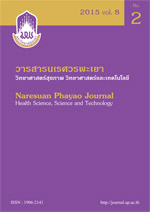ความสัมพันธ์ของประสบการณ์การมีอาการในกลุ่มอาการกับคุณภาพชีวิตและกลวิธีจัดการกับอาการของผู้ป่วยมะเร็งลำไส้ใหญ่และทวารหนักหลังผ่าตัด
Keywords:
มะเร็งลำไส้ใหญ่และทวารหนัก, อาการหลังผ่าตัด, คุณภาพชีวิต, Colorectal cancer, postoperative symptom, quality of lifeAbstract
การศึกษามีวัตถุประสงค์ศึกษาความสัมพันธ์ระหว่างอาการในกลุ่มอาการร่วมกับคุณภาพชีวิตและกลวิธีจัดการกับอาการของผู้ป่วยมะเร็งลำไส้และทวารหนัก 90 คน ผู้ได้รับการรักษา ณ โรงพยาบาลตตืยภูมิสองแห่งในภาคเหนือสิ่งพบประกอบด้วยเป็นเพศชาย ร้อยละ 64.4 อายุเฉลี่ย 58.61 ปี (ค่าเบี่ยงเบนมาตรฐานเท่ากับ 9.29) คะแนนคุณภาพชีวิตเฉลี่ยรวมค่อนข้างสูงเท่ากับ 99.87 (ค่าเบี่ยงเบนมาตรฐานเท่ากับ 7.36) เมื่อพิจารณาเงื่อนไขมุมมองส่วนบุคคลความสุขสบายทางกายภาพสูงสุดเฉลี่ย 21.01 (ค่าเบี่ยงเบนมาตรฐานเท่ากับ 3.90) ส่วนความสุขสบายจากกิจกรรมต่ำสุดเฉลี่ย 19.16 (ค่าเบี่ยงเบนมาตรฐานเท่ากับ 2.64) ความรุนแรงของอาการปวดสัมพันธ์เชิงลบกับคุณภาพชีวิตอย่างมีนัยสำคัญ (p<0.05) (ค่าสัมประสิทธิ์เท่ากับ - 0.241) สำหรับกลุ่มอาการทางเดินอาหารและกลุ่มอาการทางอารมณ์ ความรุนแรงของทุกอาการไม่สัมพันธ์กับคุณภาพชีวิต ดังนั้น พยาบาลควรใส่ใจการจัดการอาการหลังผ่าตัดเพื่อปรับปรุงคุณภาพชีวิตดีขึ้น
Relationship of symptom experiences in symptom cluster’s experience with quality of life and symptom management strategies of postoperative colorectal cancer patients
Prakaidao Sutti1, Suvimol Kimpee1, Suporn Danaidusadeekul1*, Cherdsak Iramaneerat2
1 Faculty of Nursing, Mahidol University, Bangkok, 10700
2 Faculty of Medicine Siriraj Hospital, Mahidol University, Bangkok, 10700
The study was conducted with the objective of studying the relationships of symptoms in symptom cluster with quality of life and symptom management strategies of 90 postoperative colorectal cancer patients treated at two tertiary hospitals in Northern Thailand. According to the findings, 64.4% of the patients were males with a mean age of 58.61 years (SD = 9.29) and a mean overall quality of life score of 99.87 (SD = 7.36), which was rather high. When considered in terms of individual aspects, physical happiness appeared to be the highest (mean = 21.01, SD = 3.90) and happiness from activities was the lowest (mean = 19.16, SD = 2.64). Pain severity was negatively correlated with quality of life with statistical significance (p<0.05) (r = - .241). For the gastrointestinal symptom cluster and emotional symptom cluster, severity of all symptoms was not correlated with quality of life. Thus, in managing symptoms, nurses should pay attention to postoperative symptoms in order to improve quality of life.
Downloads
Published
How to Cite
Issue
Section
License
ผู้นิพนธ์ต้องรับผิดชอบข้อความในบทนิพนธ์ของตน มหาวิทยาลัยพะเยาไม่จำเป็นต้องเห็นด้วยกับบทความที่ตีพิมพ์เสมอไป ผู้สนใจสามารถคัดลอก และนำไปใช้ได้ แต่จะต้องขออนุมัติเจ้าของ และได้รับการอนุมัติเป็นลายลักษณ์อักษรก่อน พร้อมกับมีการอ้างอิงและกล่าวคำขอบคุณให้ถูกต้องด้วย
The authors are themselves responsible for their contents. Signed articles may not always reflect the opinion of University of Phayao. The articles can be reproduced and reprinted, provided that permission is given by the authors and acknowledgement must be given.








